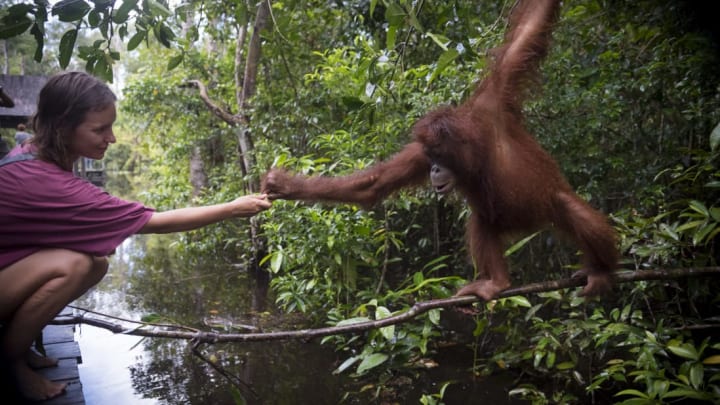Women are doing amazing work in primatology, the study of monkeys, apes, prosimians, and even humans. Although many are working on furthering our understanding of our closest relatives, we will take a look at just a few of them.
1. Vanessa Woods
Vanessa Woods is a native of Australia, a research scientist at Duke University, a writer for The Discovery Channel, and an advocate for bonobos, apes that closely resemble chimpanzees. Read about Woods research in the Congo at Bonobo Handshake and follow her blog at Psychology Today.
2. Francine Patterson
Francine "Penny" Patterson began an experiment as a graduate student in 1972. Almost 40 years later, the experiment is still going! Patterson received permission from the San Francisco Zoo to work with a one-year-old gorilla on language acquisition. So Patterson began training little Koko to use American Sign Language. The gorilla began using words within a couple of weeks, and now has a vocabulary of over a thousands words in "Gorilla Sign Language", a slightly modified form of American Sign Language. Work with Koko led Patterson to found The Gorilla Foundation, a non-profit organization dedicated to the preservation of the lowland gorilla.
3. Sue Savage-Rumbaugh
Sue Savage-Rumbaugh spent 30 years as a language researcher at the University of Georgia, during which time she taught a bonobo named Kanzi to communicate through the use of pictograms. Savage-Rumbaugh is now doing language research at The Great Ape Trust, a research center in Des Moines, Iowa. The trust is home to six bonobos and six orangutans.
4. Claudine Andre
Claudine Andre is a Belgian researcher who grew up in the Congo. She volunteered at the Kinshasa Zoo and became enamored with bonobos. In 1994 she founded Lola Ya Bonobo, a sanctuary for orphaned bonobos in the Democratic Republic of Congo. The 60 bonobos sheltered there were mostly confiscated from poachers. Andre also founded Friends of Bonobos to support the sanctuary and is trying to find ways to return orphaned apes to the wild.
5. Sarah Hrdy
Sarah B. Hrdy is an anthropologist with the University of California at Davis. Her research into human evolution led her to study primates, starting with the behavior of Hamuman Langurs in India. Since then, Hrdy uses other primates as well to develop theories that contribute to the investigation of human sociobiology and evolution. Despite a shortage of vowels, she has written a half-dozen books on the subject of motherhood in human and other primates.
6. Sally Boysen
Sally Boysen is a psychology professor at Ohio State University. She studies cognitive development in great apes, particularly the mathematical abilities of chimpanzees. She began teaching chimpanzees to count in 1984. She later worked on teach several chimps to read, including one named Sheeba, who lived with Boysen for almost all her life.
7. Mireya Mayor
Mireya Mayor is an anthropologist who studies primates and other wildlife in Africa. In 2000, she discovered a mouse lemur that is the world's smallest primate, a find that led to the establishment of a national park in Madagascar to conserve the tiny animal. A former Miami Dolphins cheerleader, Mayor received her PhD from Stony Brook University in 2008. She is a host at Nat Geo Wild where her show Mystery Gorillas is now running. Mayor's new series Wild Nights will premiere in August. Her adventures will be chronicled in a forthcoming book.
8. Birute Galdikas
Birute Galdikas has dedicated her life to orangutans; their study, protection, and conservation. She was born in Germany to Lithuanian parents and grew up in Toronto. Galdikas received her PhD in anthropology at UCLA. She launched her dream of studying orangs in Borneo with the help of renowned anthropologist Louis Leakey in 1971, and became one of "Leakey's Angels". Since then, Galdikas has been based in Asia. She founded The Orangutan Foundation International in 1986 to fund orangutan research. Galdikas isn't a hero to everyone in Indonesia, where she fights for acreage to be set aside for the apes, and fights against those who wish to use the land for more profitable endeavors. She is now a citizen of Indonesia, but spends a few months every year teaching at Simon Fraser University in Burnaby, British Columbia. She is also a full professor at Universitas Nasional in Jakarta.
9. Dian Fossey
Dian Fossey was another of Leakey's Angels. Fossey lived in Rwanda for 18 years studying the mountain gorilla in its natural habitat. She approached and befriended a colony of gorillas, gaining their trust over time, and was even accepted as a member of their group. Over the years, Fossey wrote about her relationship with the gorillas, which led to the supporting of her work through the Digit Fund (named after her favorite juvenile gorilla), which later grew into the organization The Gorilla Fund. Fossey's conservation efforts were not welcomed by Rwandan poachers, whom she fought tooth and nail. She was found murdered in her cabin in 1985. The crime was never solved. Fossey had already written the book Gorillas in the Mist, which became a major motion picture in 1988.
10. Jane Goodall
The third member of Leakey's Angels here, Jane Goodall is currently the premier authority on chimpanzees. Goodall first traveled to Africa from her native England in 1957. There, she met and impressed Louis Leakey, who hired her to do research on chimpanzees. Goodall began her research at Gombe, Tanganyika (now Tanzania). Over the years, she documented the social structure of a chimpanzee colony and reported on it for National Geographic Magazine. Goodall founded the Jane Goodall Institute in 1977. The foundation works to conserve areas where chimpanzees can flourish, and funds research into our understanding of these apes who are so closely related to us. In 1994, Goodall also founded TACARE, an organization dedicated to helping the people of Tanzania. Now 76, she travels the world to educate people about apes and raise funds for chimpanzee conservation.
